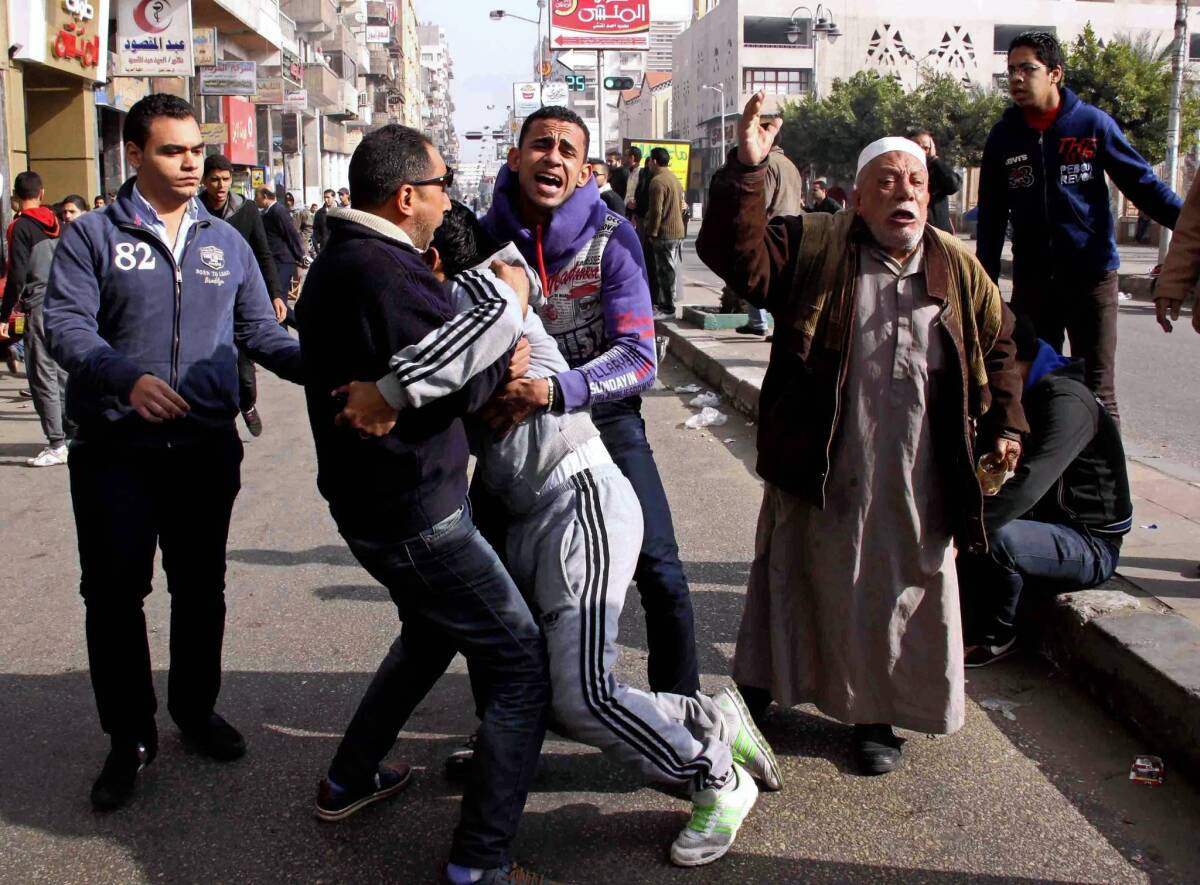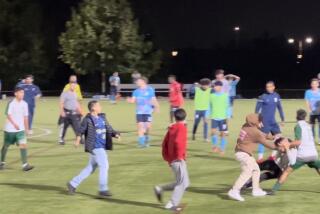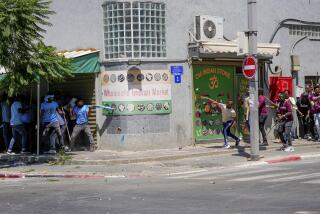Rioting follows soccer verdict in Port Said, Egypt

CAIRO — Deadly clashes and an attempted jailbreak erupted in the Egyptian city of Port Said after 21 soccer fans were sentenced to death for killing rivals in a riot last year that underlined the nation’s wider unrest and deepening political schisms.
At least 30 people were reported killed Saturday, including two police officers. Buildings burned and mobs ran through the streets hoisting the wounded and chanting against the government. Concern intensified that protesters would take up weapons smuggled in from Libya and Sudan.
The violence, which followed Friday’s deadly riots around the country against the Islamist-led government, revealed how frayed and frantic Egypt has become two years after the toppling of Hosni Mubarak. The economy is faltering amid growing disdain for President Mohamed Morsi and his increasingly isolated party linked to the Muslim Brotherhood.
A succession of crises has overwhelmed Egypt’s transition toward democracy and made evident that Islamist political forces have failed to provide a unifying vision that encapsulates the hopes of a revolution that ended 30 years of corrupt rule. Instead, firebombs flare at barricades, riot police hunker, and mothers trail the coffins of fallen sons.
Gunshots and tear gas volleys rang out in Port Said between security forces and supporters of the Masry soccer club after the death sentences were read. Families attempted to storm the jail where their relatives and former police officials were imprisoned on charges of killing 74 people in the stadium melee last year.
Port Said has become a dangerous subplot to Egypt’s political turmoil. Many residents believe security forces instigated the soccer riot. The bloodshed Saturday indicated that police — the symbol of Mubarak’s repression — remained deeply reviled and in disarray. The army deployed troops to the city to protect the prison and other government buildings from looting and arson.
“What’s happening in Port Said today makes me question right from wrong,” said activist Heba Mahfouz, 23. “We never really had an appreciation for law enforcement. There is an emotional line that has been broken between Egyptians. We are now killing each other.”
Clashes also broke out in Cairo, where men and boys hurled Molotov cocktails and tried to overrun the upper house of the parliament. Soldiers guarded the streets in Suez, where the fire department was set alight and prisoners escaped from a police station after it was attacked by mobs. At least seven people, including two police officers, were killed in Suez on Friday.
Morsi has not addressed the country since the nationwide violence began late Thursday. He tweeted on Friday that “state agencies will not hesitate to prosecute offenders and bring them to justice.”
His National Defense Council released a statement Saturday expressing “its sorrow and condolences for what has happened and those who died across the country.”
Information Minister Salah Abdel-Maksoud said the military, which ruled the country for more than 18 months before Morsi took office in June, would not interfere in political affairs. He added, however, that the defense council “holds the right to declare a state of emergency and a curfew, if needed.”
Restiveness is spreading, especially among young men in the industrial cities along the Suez Canal: Ismailia, Port Said and Suez. These towns have seethed for years, and their protesters have often been more confrontational than those in Cairo. Jobs have disappeared, suspicion is high, and men are quick to shield their faces in rags and charge police.
Morsi has been criticized for accumulating power and sidestepping the courts in what the opposition calls the “Brotherization” of the country to propel an Islamist agenda. This was epitomized by the Islamist-backed constitution that passed in December and has created concern among rights groups that it threatens social justice.
In a statement Saturday, a coalition of opposition parties called for amending the “disfigured” constitution and for a “national salvation government” to subject the “Muslim Brotherhood to the rule of law after having been a key player in running the affairs of the country without any legal justification.”
The tumult comes as Morsi is attempting to allay international concern about his handling of the country. Egypt desperately needs foreign investments and grants to ease public debt and revive the economy. Cairo is awaiting a $4.8-billion loan from the International Monetary Fund. The deepening unrest has not inspired confidence.
The verdict in the soccer riot case was anticipated to be a spark for bloodshed.
The accused Masry fans were charged in the deaths of 74 fans of Cairo’s Ahly soccer club during a match in Port Said in February. Masry supporters went on a rampage with knives and pipes, trapping Ahly fans in a locked stadium. Many were trampled to death, and some died after tumbling from the stadium’s balconies. More than 1,000 people were injured.
Hard-core Ahly supporters, known as Ultras, recently threatened to attack police and government institutions across the country if death penalties were not handed down.
Former police officers charged in the case are expected to be sentenced in March. The Ahly Ultras say security forces orchestrated the stadium attack as retribution for the group’s long resistance to the police state and its role in the uprising that brought down Mubarak. On Saturday, the Ultras said they would not react until the sentencing of 54 other defendants, including the former officers.
“We are waiting for the March 9 verdict,” said an Ultra fan who asked not to give his name. “This fight was between us and those responsible from the military, police and government. We vowed retribution or chaos. We will take our revenge.”
The father of one of those killed in the stadium riot was happy with Saturday’s sentencing.
“We are satisfied with this verdict, and God willing the rest of the defendants will receive the same sentence,” said Bassem Dessouky. “I thank God first and then the Ultras; they are respectful youths who helped us and stood by us every step of the way.”
But across Port Said mobs attacked police stations, blocked roads and surrounded the morgue. Women wailed and men raced through the streets in rage. More than 300 people were injured, and two soccer players for Port Said clubs were shot and killed in the chaos.
Many said the verdicts tarnished the city’s image and made scapegoats of Masry’s fans instead of focusing on the complicity of former police and security officers. Masry supporters believe remnants of the Mubarak regime instigated the soccer riot to destabilize the country.
“The police are thugs!” families yelled in the courtroom before the verdict was read.
On the streets outside they chanted: “Oh, you dirty government.”
Abdellatif is a special correspondent.
More to Read
Start your day right
Sign up for Essential California for news, features and recommendations from the L.A. Times and beyond in your inbox six days a week.
You may occasionally receive promotional content from the Los Angeles Times.






